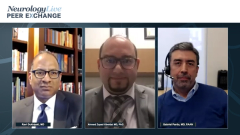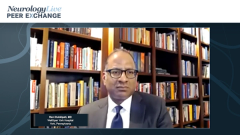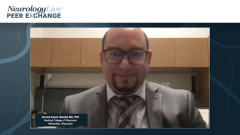
Generic DMTs as First-Line Treatment in RRMS
Ahmed Zayed Obeidat MD, PhD; Ravi Dukkipati, MD; and Gabriel Pardo, MD, FAAN, consider reasons to use generic disease-modifying therapies (DMTs) as a first-line therapy in the treatment of relapsing remitting multiple sclerosis (RRMS).
Episodes in this series

Ahmed Zayed Obeidat MD, PhD: Back to talking about generic medication. When you diagnose a new patient do you think of them first? When do you think about them as your first go-to? I was trying to think if I ever did that. But I don’t think I’ve ever thought about a generic as a first one to do. I often think about the class of medicine and then there are multiple medications within the class. Some are brand, and some may be generics. But then I don’t think I’ll be like, I want the generic for that particular patient. Is there any reason you would think that you would consider using a generic DMT [disease-modifying therapy] as a first line? Maybe access. Maybe something like this where it can come to mind. Dr Pardo, what do you think?
Gabriel Pardo, MD, FAAN: I think that the only reason would be access. If that is guaranteed that they will be able to get on the medication, the class of medications that we selected through a generic, I’m OK with that. Do I think of a generic as my first option? No, I don’t. Again, same as you and Dr Dukkipati. I already have in my mind what are the best mechanisms of action to treat the disease in even that patient, and we’re going to counsel them and steer them a little bit toward that decision with all the information that they need to make the final decision, but certainly, that is our role as advisers, as counselors. We understand the disease process, we understand the medications, we understand their situation, and we put it in context for them to make a final decision.
But that is certainly something that we need to put a lot of effort into as physicians in doing that to begin with. So, a generic is not what I have front of mind. I have a mechanism of action, I have perhaps a specific type of medication. And the only reason that I’ll say that’s fine is if that medication is available to the patient only as a generic, I’m going to say OK. Let’s try it. Again, just the access would be the main driver.
Ahmed Zayed Obeidat MD, PhD: Dr Dukkipati, do you agree or have other thoughts?
Ravi Dukkipati, MD: Yes. While you were both talking, I was thinking in my mind, I don’t think I have ever thought of a generic proactively as my first choice for a patient. And the only scenario where I would accept a generic would be if it were an insurance-based decision because at the end of the day, a drug is better than no drug.
Ahmed Zayed Obeidat MD, PhD: And this is something we’re going to be running into more and more now with more generics coming to market from the same mechanism of action. The classic one I think now is fumarates where I see many forms. There are many brand forms and then there are many generic dimethyl fumarates. And then this is where sometimes I say well, we want fumarate for this patient. This is what we think is the best one. Then whatever we can get. Whatever generic or a brand of certain formulation we can get then we use it. So that’s one of the only times where I think we can get the generic as a first line for a patient.
Transcript edited for clarity
Newsletter
Keep your finger on the pulse of neurology—subscribe to NeurologyLive for expert interviews, new data, and breakthrough treatment updates.














